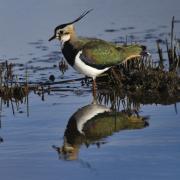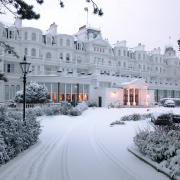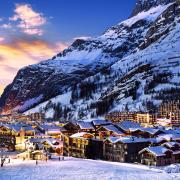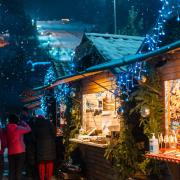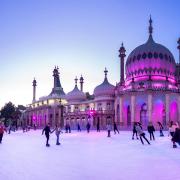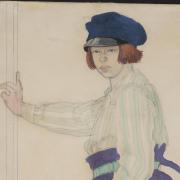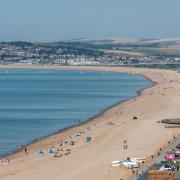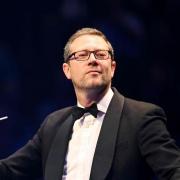While many do fun runs for charity, Alexander from Haywards Heath has completed an epic walk following in the footsteps of ancient pilgrims to Rome
Alexander loves singing. He has been in the choir at his local church, St Wilfrid's in Haywards Heath, for 14 years but it wasn't performing there that hit the high note for him. That honour belongs to an epic journey where he walked 1,500 miles from his home to Rome. On the way he sought shelter in churches, faced numerous challenges and nursed countless blisters. But it was worth it, the 23-year-old insists, as with every step he was raising money to pay for much-needed improvements to the church. ‘It’s a Victorian church, with Victorian facilities,’ Alexander explains. ‘It is a fantastic building, but to be a fantastic venue the amenities need to improve. The long-term aspirations are to better serve the community including as a concert venue.
‘About a year ago I learned that there was an existing pilgrimage route from Canterbury to Rome. I like long distance walking and have done a lot in the South Downs and Pembrokeshire coastal path.

Alexander began his pilgrimage on March 31, on a crisp clean Easter Sunday morning. It would be just over three months later that he would enter the Eternal City, completing a 78mile walk to Canterbury first and then a further 1,491 miles to Rome.
Following a centuries old trail, the Via Francigena, it crosses the channel to France, through Switzerland and down through Italy. It’s a route that follows the footsteps of Archbishop Sigeric, who took this path on his pilgrimage to Rome from Canterbury in 990. The manuscript detailing his journey is in the British Museum. A zero-milestone marking the beginning of the route can be seen in the south porch of Canterbury Cathedral.

Alexander admits that even with the help of modern day technology and amenities the pilgrims didn't have - such as trainers, plasters for his sore tired feet, and a tent and camping equipment, he was 'woefully' ill prepared.
‘I was at university writing my thesis and a week after I submitted it, I was on the road,' he says. 'I didn’t have much time to prepare, only to get the kit including a tent and sort out the extra route, beyond that I was woefully unprepared. When I met a pilgrim on the ferry crossing the channel I thought, “Oh my goodness, he's got everything; He's got all the gear and he’s practised French.” I felt very inadequate!’
Alexander followed a guide for some of the route but found it impractical to stick to it exactly. ‘I generally walked about 30 km a day and would see where that would get me. You don't know what the weather is going to do and when you have reached your limit.’
Alexander’s journey included home stays, wild camping, some unusual places and a more familiar stop.
‘I stopped at my grandmother's in Kent as it was right on the path. I was fed well,’ he laughs. ‘Château de Villers-Chatêl, dating back to the 15th century was an incredible experience. There were a couple of castles in Italy including Piagnaro Castle, in Pontremoli. This castle is a museum during the day, and by night they welcome pilgrims. It’s the first time I’ve been given keys to a castle.’
Alexander took a pilgrim passport with him which allowed him access to specific accommodation, and to track his route, picking up stamps along the way. He walked with people from all over the world, sharing stories and even Galette recipes.
‘I walked with an Italian for three weeks and an American and Frenchman for two weeks. Sometimes you're walking with company because you are walking at roughly the same pace or you meet them at the end of the day as you're staying at the same accommodation. Sometimes there are people you won't see for a few days and then will meet again.

‘I can say that one of the few constants on the changing journey through countries, climates and cultures, has been the enduring kindness of strangers. Generosity has stretched from directions to accommodation, and from camping in gardens to refreshments for a weary walker.
‘In France, there's no established network of hostels for pilgrims so accommodation is with families. At €10 a night they don’t make a profit, that’s for sure, but do it out of kindness. They will do whatever they can to help you, whether that's sorting out food for the next few days or advising on routes.’
Alexander describes his journey as a ‘religious, cultural and emotional roller coaster.’ One of contrasts, of inevitable lows but ‘some truly stunning highs.’
‘I learnt the French word for hail which is grêle. I'm not very good at languages, but I won’t forget that one. The hail in France was absolutely horrific and the wind at times, too.
‘One night I slept in a church on the floor. It was in France, in a town with a population of around 10-15 people. There was no one about and I couldn't camp either. I was exhausted and out of options, so I just sat down in the church and snoozed a little. I got maybe two hours sleep and left at 4am in the morning. Thank goodness the church was unlocked.’

Lack of a shower, washing clothes and blisters were up there in the list of challenges. ‘There were too many blisters to count in the end,’ says Alexander.
‘A pair of trousers was torn at the crotch - a problem when washing both pairs of underwear; my boots wore down, giving my gait a wonkiness that amused many a Belgian, and I won’t mention the state of my socks. My Brasher boots covered 2,400 kilometres, that's not bad.’
One high literally was the Great Saint Bernard Pass, the highest point of the journey on the Swiss-Italian border. Despite it being too difficult to access a couple of days earlier he was advised that it was passable. ‘My French is not the best and I thought she said there were three centimetres of snow. What she actually said was that there were 13 centimetres of fresh snow and underneath more like five metres.
‘It was an incredible experience. The weather was stunning for that one day. I was able to climb to the top of the pass following tracks cut into the snow.’

Alexander’s journey had taken him through fields once the scenes of battle in France, skirting Lake Geneva, across the snowy passes of the Alps and down to picturesque Tuscany. He had the best croissant ‘I have ever eaten’ at La Viennoise in the old centre of Besançon; listened to a French woman recall memories of the World War Two occupation and attended Sunday evening prayer, sung by monks at The Abbey of Saint Maurice.

And after a few days he began planning his next walk. ‘I’m thinking the Lycian Way in Turkey, its oozing history,’ he says. 'I hope they have good food. One thing I’ve learned recently is that it's simply not possible to grow tired of pizza.’
Alex has so far raised £2045 towards church repairs. To sponsor Alexander, visit justgiving.com/page/hh2rome






